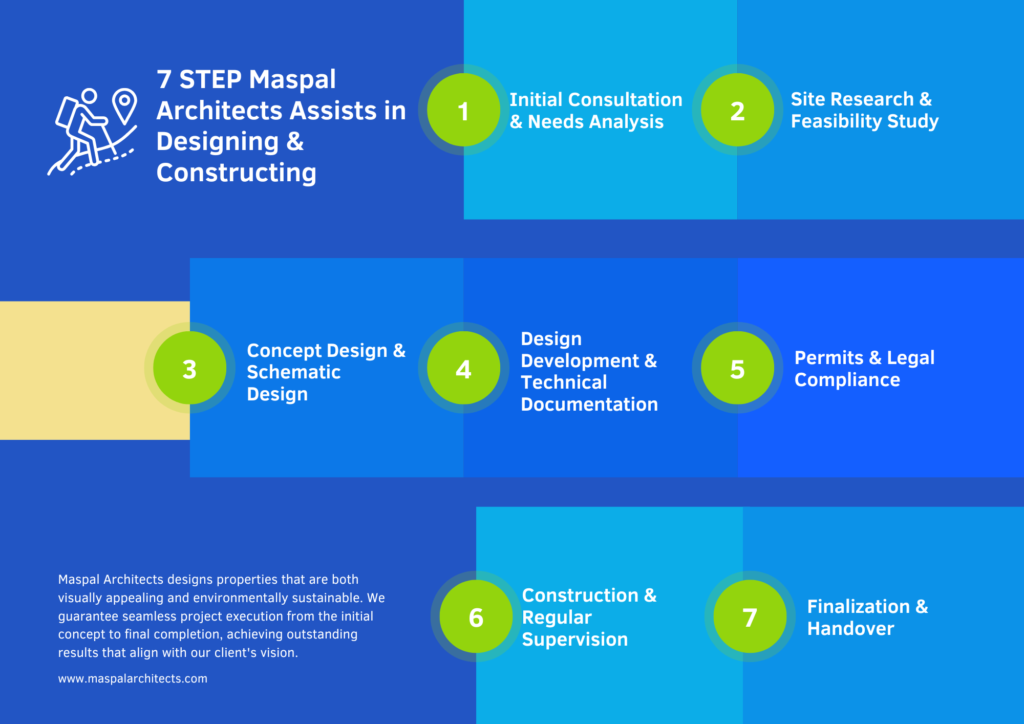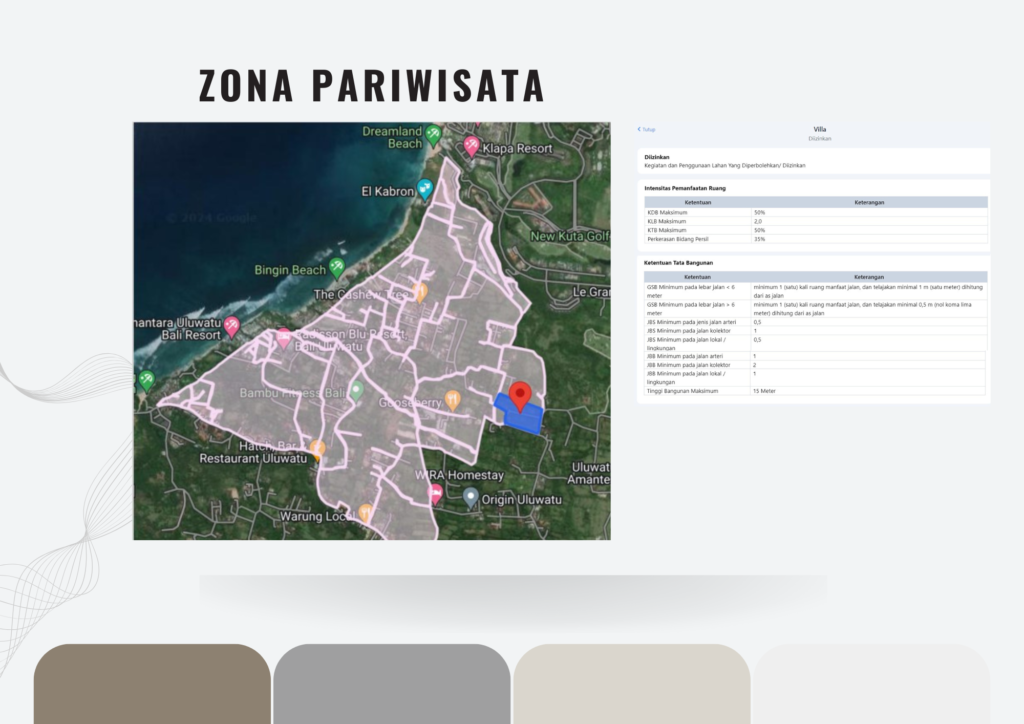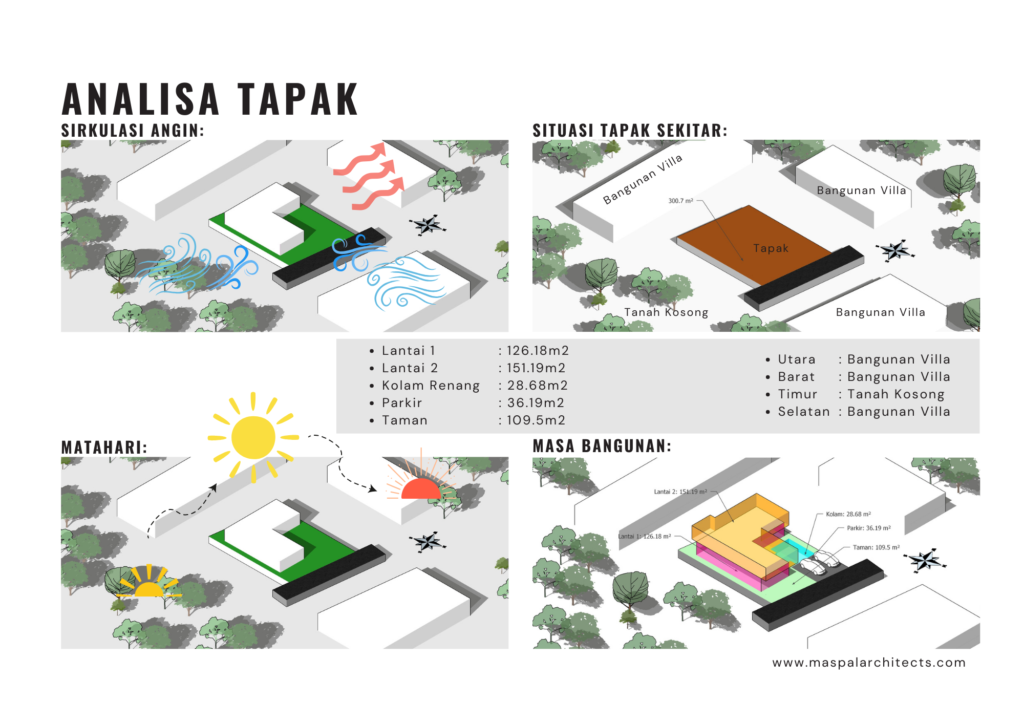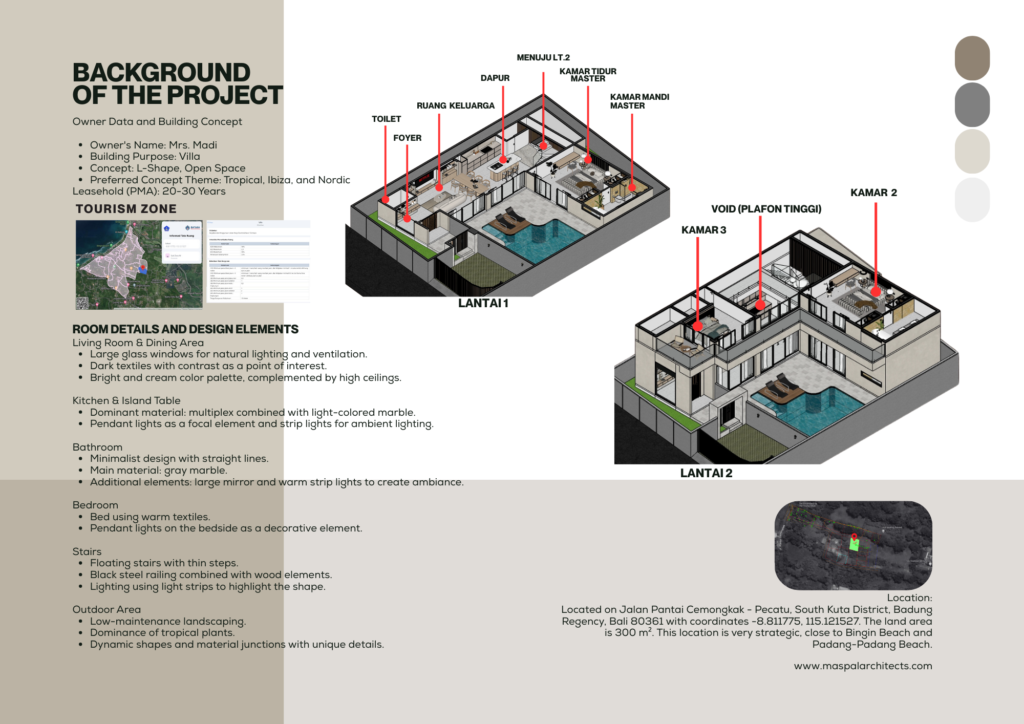7-Step Construction Guide: How to Build in Bali Efficiently

How Maspal Architects Supports the Design & Construction of Tropical Properties in Bali
Building a property in Bali requires a structured approach to ensure a smooth and successful project. This 7-Step Construction Guide covers everything from land selection to final handover, helping you navigate the construction process in Bali with ease. Whether you’re planning a villa, resort, or commercial space, following this step-by-step approach ensures compliance with local regulations, sustainable design, and high-quality execution.
1. Initial Consultation & Needs Analysis
The first step in any successful project is understanding your goals, budget, and vision. During this phase, Maspal Architects conducts a detailed discussion to gather insights about your property’s purpose, design preferences, and functional requirements. We also provide expert advice on the best design strategies tailored to Bali’s tropical environment.
Understanding Your Vision: The First Step in Designing a Tropical Property with Maspal Architects
- Clients contact Maspal Architects to discuss their project needs and vision.
- We conduct an analysis of the location, property purpose (residential, commercial, or villa), and available budget.
- Introduction to tropical architecture principles, emphasizing thermal comfort, airflow circulation, and sustainability.
2. Site Research & Feasibility Study
Choosing the right location is crucial for both legal compliance and design feasibility. Our team performs an in-depth site analysis, evaluating factors such as topography, zoning regulations, accessibility, and environmental impact. This study helps us determine the best approach to maximize the site’s potential while adhering to local laws.
Site Analysis & Regulations: Key Factors in Building a Tropical Property in Bali
- Site surveys are conducted to understand land characteristics, topography, soil depth tests, accessibility, and surrounding environment.
- Analysis of zoning regulations and building codes in Bali to ensure legal compliance.
- Study of local materials and construction techniques suited to the tropical environment.
Site Analysis in Bali: Understanding KDB, KLB, and Local Conditions Before Starting Design
Before proceeding to the schematic design phase, every architectural project must begin with a thorough site analysis. At Maspal Architects, this process is essential to ensure that each design responds effectively to local regulations, environmental conditions, and cultural context—especially in Bali.
A. Zoning & Regulatory Analysis
In Bali, several planning regulations influence how a property can be developed:
- KDB (Building Coverage Ratio): Limits how much land can be physically built on.
- KLB (Floor Area Ratio): Determines the total buildable floor space relative to the land size.
- GSB (Building Setback Line): Ensures the building is appropriately distanced from roads, rivers, or neighboring properties.
- Height Restrictions: In many parts of Bali, building height is limited (typically under 15 meters) to respect traditional Balinese planning norms.
- Zoning (RTRW/RDTR): Defines allowable land uses—residential, commercial, tourism, etc.—and must be reviewed before design.
Our team works closely with notaries and planning officials to verify land legality, zoning classification, and building permit eligibility (PBG/IMB), ensuring a smooth and lawful process.

B. Environmental & Climatic Analysis
Designing in a tropical climate like Bali requires an in-depth understanding of environmental conditions to maximize comfort and energy efficiency. We analyze:
- Sun Path: Understanding solar orientation helps us design shading elements, optimize natural lighting, and reduce heat gain—especially on west- and east-facing façades.
- Wind Flow & Natural Ventilation: Bali benefits from consistent wind patterns (especially from the southeast). We design building openings and massing to capture and circulate this airflow, reducing the need for artificial cooling.
- Rainfall & Drainage: Heavy rainfall is common in Bali. We assess site gradients, existing drainage, and water flow to integrate proper rainwater management systems.
- Topography: Slope, elevation, and landform analysis help determine the best placement for structures and support cost-effective foundation planning.
C. Site Context & Massing

We carefully examine the site’s surroundings, including:
- Neighboring Structures: To ensure privacy, view optimization, and harmonious scale.
- Road Access & Entry Points: For functional circulation and clear zoning between private and public areas.
- Vegetation & Natural Features: Mature trees or landscape elements may be preserved or integrated into the design.
- Building Massing Strategy: Based on site dimensions, sunlight, and wind, we plan the orientation and shape of building volumes to optimize spatial quality, thermal comfort, and aesthetics.
3. Concept Development & Schematic Design
Once the feasibility is confirmed, we develop the initial design concept, including floor plans, elevations, sections, and 3D visualizations. Maspal Architects focuses on tropical design principles, ensuring natural ventilation, energy efficiency, and the use of sustainable materials to enhance the property’s comfort and durability.
Concept Development: From Initial Design to 3D Visualization
- Initial concept design based on site analysis and client consultations.
- Creation of preliminary floor plans, building elevations, sections, and 3D models for early visualization.
- Revisions based on client feedback to ensure the concept meets their needs.

4. Design Development & Technical Documentation
After finalizing the schematic design, we move to the technical stage, where detailed architectural drawings, structural calculations, and MEP (mechanical, electrical, plumbing) plans are developed. These documents ensure smooth execution during construction and compliance with Bali’s building standards.
Design Development: Detailed Architectural Planning & Cost Estimation
- Refinement of the concept into a more detailed architectural and structural design, including material selection and key architectural elements.
- Preparation of technical working drawings, covering construction details, mechanical, electrical, and plumbing (MEP) systems.
- Construction cost estimation based on a Bill of Quantity (BOQ) to ensure cost efficiency.
5. Permits & Legal Compliance
Navigating the permit process in Bali can be complex. Maspal Architects assists in securing all necessary permits, such as IMB/PBG (Building Permit) and environmental approvals, ensuring your project adheres to local regulations. Our legal team works closely with authorities to expedite approvals and avoid potential setbacks.
Streamlining Permits & Legal Compliance for Your Bali Property
- Assistance with Building Permit (IMB/PBG) applications and other necessary legal documents in compliance with Bali regulations.
- Consultation with notaries and legal professionals to ensure that the property’s ownership and permits are secure.
6. Construction & Periodic Supervision
With all plans and permits in place, construction begins. Maspal Architects offers project management and supervision services to ensure that the building process follows the approved design, specifications, and quality standards. Regular site inspections help maintain efficiency, prevent issues, and ensure smooth progress.
Expert Project Management & Supervision for a Seamless Construction Process
- Construction begins with the selection of a reliable contractor.
- Maspal Architects provides regular site supervision to ensure that the work follows the technical drawings and meets quality standards.
- Evaluation of construction progress and necessary adjustments if required.
7. Finalization & Handover
As construction nears completion, we conduct a thorough final inspection to ensure every detail aligns with the initial design and quality expectations. The handover process includes as-built documentation, maintenance guidelines, and a final walkthrough to ensure your satisfaction with the completed property.
Final Inspection & Handover: Ensuring Quality and Client Satisfaction
- Final inspection of the completed construction before handover to the client.
- Testing of systems (water, electricity, ventilation) to ensure proper functionality.
- Delivery of final documentation, including as-built drawings, building certificates, and supporting legal documents.
Conclusion
Why Choose Maspal Architects?
Building a property in Bali requires more than just design and construction—it demands a deep understanding of tropical climate considerations, sustainable architecture, and local regulations. At Maspal Architects, we specialize in creating high-quality, environmentally responsive designs that blend seamlessly with Bali’s unique landscape and lifestyle.
From the very first step of land selection to the final handover, our team provides comprehensive support, ensuring a smooth, transparent, and legally compliant process. We prioritize efficiency, sustainability, and innovative design to create properties that not only look stunning but also provide long-term comfort and durability.
Whether you are developing a private villa, commercial space, or a luxury resort, Maspal Architects brings expertise, creativity, and meticulous project management to turn your vision into reality.
📌 Why work with us?
✅ Expertise in tropical and sustainable architecture
✅ End-to-end service from land acquisition to final construction
✅ Transparent budgeting and legal compliance
✅ High-quality design and construction supervision
🚀 Ready to build your dream property in Bali? Contact Maspal Architects today for a consultation and let’s bring your vision to life!
📩 Email: [email protected]
📷 Instagram: @maspalarchitects
📞 WhatsApp: +62 877 8096 8589
🌐 Website: maspalarchitects.com

